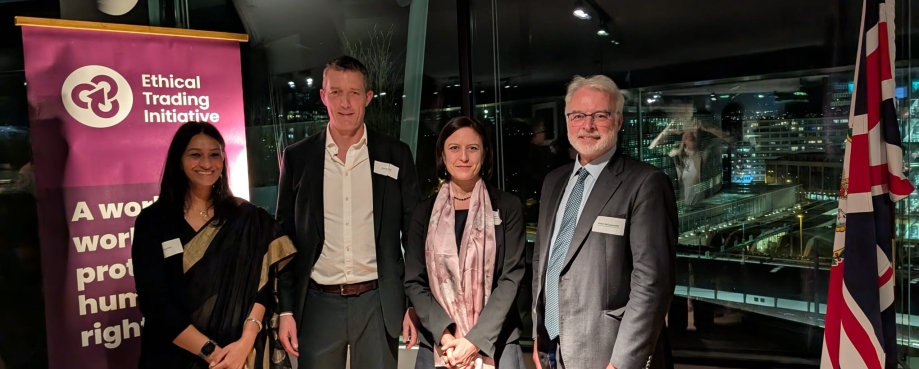
2024 has brought increasing momentum on regulatory measures relating to human rights and environmental due diligence, with requirements that extend along global supply chains.
These measures have the potential to increase respect for human rights, labour standards, and environmental sustainability, but without a ‘smart mix’ approach, could these measures limit participation, market access, and potentially increase the vulnerability of rightsholders in emerging economies?
Progressing the conversation
Last month, ETI co-hosted an event held on the margins the UN Forum on Business and Human Rights, in collaboration with the UK Foreign, Commonwealth and Development Office and UK Mission Geneva. Our event welcomed stakeholders from across the business and human rights landscape, to progress the conversation on what ‘smart mix of measures’ is needed to maximise the protection and respect for human rights in global supply chains, whilst limiting possible unintended consequences.
Joined by representatives from civil society, trade unions, companies, investors and governments worldwide, we witnessed powerful remarks by leading experts including the UK Ambassador for Human Rights and Deputy Permanent Representative to the UN in Geneva, Eleanor Sanders, Member of the UN Working Group on Business and Human Rights, Barrister & Emeritus Professor, Robert McCorquodale, Business and Human Rights Specialist with the UNDP in Asia and the Pacific, Harpreet Kaur, and our own Executive Director, Giles Bolton.
Each offered unique insights into the pressing issues surrounding human rights, environmental sustainability, and business practices in today’s global landscape.
Eleanor Sanders opened the event with a call to action, emphasising the importance of navigating an increasingly complex world where conflicts, climate change, and humanitarian crises shape business operations. She stressed that while governments play a key role in protecting human rights, businesses must also take responsibility for their impact on people and the environment. Her message was clear: International standards, such as the UN Guiding Principles on Business and Human Rights, are essential in ensuring companies uphold their responsibilities, particularly when engaging in global supply chains. Eleanor also highlighted a recent report funded by the FCDO, offering sixteen key recommendations aimed at mitigating unintended consequences in emerging economies and ensuring that the voices of the most vulnerable are heard.
Representing the UN Working Group on Business and Human Rights, and organisers of the annual UN Forum, Robert McCorquodale reflected on the growth and progress of the business and human rights movement:
“20 years ago, this room would have been considerably less busy, as there was not a "field" of business and human rights as such, and very few in government or business acknowledged that business had a responsibility to respect human rights. In the years since, we have seen a huge shift from some voluntary standards towards mandatory regulations, we have seen some business leaders put in place valuable processes and actions, and a rise in civil society organisations with expertise in this area. There is still much to do, especially on access to effective remedies for those adversely affected by business activities, so there needs to be more active engagement between all stakeholders to push for positive changes in the business and human rights field."
Harpreet Kaur highlighted the need for a "smart mix" of measures - combining both voluntary and mandatory regulations - to ensure that business and human rights policies are impactful. She noted the challenges faced by businesses in emerging markets, particularly in Asia and Africa, where compliance costs and rigid regulations could risk harm to local economies. Her speech also emphasised the importance of engaging directly with rightsholders, such as women, Indigenous peoples, and informal workers, rather than relying on intermediaries. She highlighted how few corporate human rights managers confessed to actually having met rightsholders themselves and called for genuine, inclusive and meaningful dialogue, underscoring the need for a deeper understanding of the diverse challenges that different groups face within global supply chains.
Giles Bolton brought real-world examples to the forefront. His speech focused on ETI’s work in driving multi-stakeholder collaboration, highlighting examples in the Kenya tea sector, where significant issues of sexual and gender-based violence were identified through media investigations and overlooked by traditional audits. He shared outcomes from ETI’s collaborative efforts, which brought together brands, unions, NGOs, and local civil society organisations to work together to address the root causes of these human rights violations. This case study served as a powerful reminder that effective collaboration - across sectors and industries - is essential to making real progress in tackling human rights issues.
What's next?
Each speaker made it clear that addressing human rights and environmental abuses is not just about compliance but about fostering long-term, transformative change. While increased regulatory measures are welcome, what is essential is that workers are placed at the heart of the process - from identifying risks through to remediation. Paper-based compliance won’t actually drive improvement: engaging with workers and their representatives and collaborating to create change is the only way to do it.
As we move forward, the key takeaway from this event is the importance of collaboration, meaningful stakeholder engagement, and a nuanced approach to business and human rights. By bringing together diverse stakeholders and putting the rights of workers and vulnerable groups at the centre of our efforts, we can ensure that businesses contribute positively to society, empowering communities while safeguarding human rights and the environment for future generations.
The discussions sparked at this event and last month’s UN Forum are only a small part of what must be an ongoing global conversation about the future of business, human rights, and sustainable development. At ETI, we will continue to foster dialogue on these issues between our tripartite of NGO, trade union and company members.
...
For more information on how we work read our latest impact report and explore our member initiatives focused on addressing key human rights issues in global supply chains.
